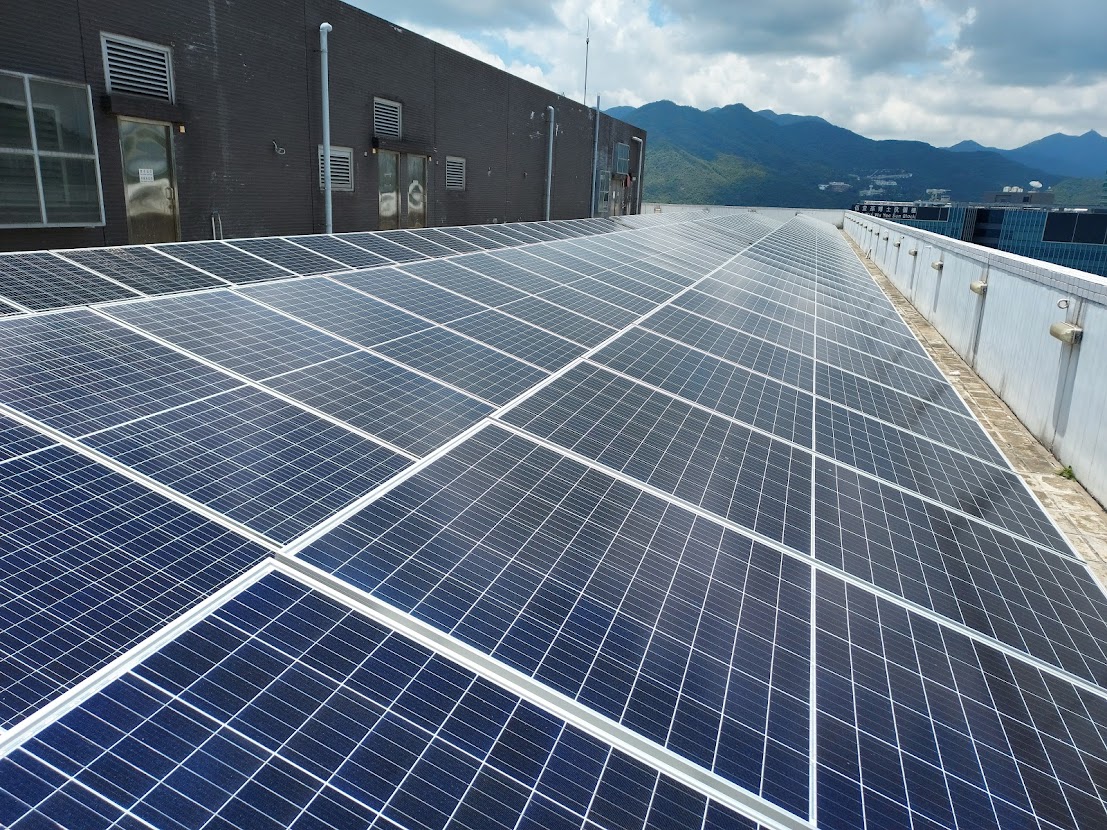Climate Action and Resource Conservation
CUHK cares about nature and strives to become a role model and minimize negative impacts on the environment. We encourage our staff and students to consume energy and natural resources frugally and minimize waste generation. We have established policies on energy conservation, waste management and sustainable procurement, and have taken multiple actions to reduce disposables to landfills and plastic use.
Carbon neutrality

Solar photovoltaic panels have been installed on the roof of buildings
CUHK released the Campus Master Plan outlining its commitment to climate action in 2010. The Plan was shared with stakeholders through public consultations. In 2021, CUHK announced its commitment to the achievement of carbon neutrality (USR Goal 4 in the Strategic Plan refers), alongside the pledges of Mainland China and Hong Kong to advance to net zero carbon emissions by 2060 and 2050 respectively. We have engaged a consultant to assist the University in reviewing and preparing a pathway and action plan towards carbon neutrality in early 2023 to address the various scopes of carbon emissions (Scopes 1, 2 and 3).
CUHK measures, reviews and reports on (e.g. through the Hong Kong Sustainable Campus Consortium) its energy consumption and carbon footprints regularly and conducts a carbon audit annually, following the guidelines, published by the Hong Kong SAR Government, which are in line with The Greenhouse Gas Protocol. The audit takes into account the share of low-carbon energy sources from the local power company. The first report took place in 2005/06 and recorded an amount of 45,021 tonnes for Scope 1 and Scope 2 emissions. In 2023/24, the amount of Scope 1 and Scope 2 emissions were 51,566 tonnes, while the amount of Scope 3 emissions was 1,195 tonnes. The amount of low-carbon energy used by the University was 406,237 GJ, the purchased electricity, in which the fuel mixes contained landfill gas and clean energy.
Since May 2019, the University has joined the HKSAR Government’s Feed-in Tariff (FiT) Scheme to sell to the local power company the clean energy generated by the solar photovoltaic (PV) panels installed on campus. In 2023/24, the amount of solar energy generated on campus was 1,837,913 kWh. To achieve carbon neutrality, CUHK launched the ‘Solar on Campus’ initiative in 2021 to maximize the utilization of renewable energy on campus. In September 2023, large-scale works on the construction, installation, operation and maintenance of solar PV systems on campus buildings started. As of 30 June 2024, installations have been completed in 7 buildings. By the end of 2025, installations will be completed in around 100 buildings across campus.
Waste management

CUHK’s Waste Management Hierarchy
CUHK’s waste management approach emphasizes the ‘6Rs’ principle: Rethink, Refuse, Reduce, Reuse, Repair and Recycle, where the top priority is to reduce waste at source and encourage cyclical use of resources while disposal at landfills is only the last resort. Our Waste Management Policy and Guidelines cover the handling and disposal of different waste types including event-related waste, used electrical and electronic equipment, used furniture, municipal solid waste, hazardous waste, and construction waste.
The University has also implemented policies and organized programmes/events aimed at the minimization of disposables, such as the Guidelines for Sustainable Event Planning and Management, Sustainable Student Orientation Sponsorship and Green Congregation, and ‘Plastic-free Campus‘ Campaign targeting souvenirs, gifts and flower bouquets and plastics, including bottled water, straws and cutlery items. To encourage staff and students to bring their own water bottles and minimize plastics, around 100 Go Green Water Stations (drinking water fountains) have been installed across campus.
All sustainability-related guidelines (including the Waste Management Guidelines, Sustainable Procurement Guidelines, Guidelines for Sustainable Event Planning and Management and Outsourcing Policy) are applicable to outsourced suppliers, service providers and contractors.
CUHK regularly monitors the amount of municipal solid waste (MSW) generated and recycled and reviews its waste management performance. In 2023/24, 1,882 metric ton (mt) of MSW was generated, of which 832 mt was recycled.
PREVIOUS
Education for Sustainable Development
NEXT
Health and Well-being

